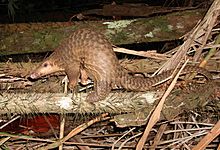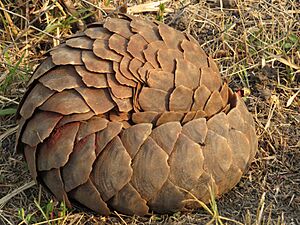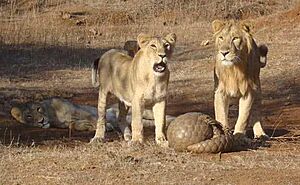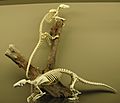Pangolin facts for kids
Quick facts for kids Pangolins |
|
|---|---|
 |
|
| Scientific classification | |
| Kingdom: | |
| Class: | |
| Infraclass: | |
| Superorder: | |
| Order: |
Pholidota
|
| Family: |
Manidae
Gray, 1821
|
Pangolins, also called scaly anteaters, are amazing mammals. They live in parts of Africa and Asia. Imagine an animal covered in tough scales, like a walking pinecone! That's what a pangolin looks like. These scales are made of keratin, the same stuff as your fingernails. Pangolins are known as scaly anteaters because they love to eat ants and termites.
Contents
Where Do Pangolins Live?
Pangolins live in different parts of Asia and Africa. There are eight unique types, or species, of pangolins. Four species live in Asia, and four live in Africa.
- Asian Pangolins: These pangolins can be found in countries like India, China, the Philippines, and Indonesia. They often live in forests, grasslands, and even farm areas.
- African Pangolins: You can find these pangolins across Africa. They live in places from dry savannas to wet rainforests. Countries like Nigeria, Uganda, and South Africa are home to them.
What Do Pangolins Look Like?

Pangolins come in various sizes and colors. Their look depends on their specific species.
- Size: Pangolins can be small, about 1.6 feet long. Others can grow to over 5 feet long, including their tail.
- Scales: Their scales are usually brown or yellowish-brown. This coloring helps them hide in their surroundings.
- Body Shape: Pangolins have a long, thin body with short legs. They have very strong claws. They use these claws for digging into the ground.
- Head: Their head is small and shaped like a cone. They have no teeth! Instead, they have a long, sticky tongue. They use this tongue to slurp up ants and termites. This amazing tongue can even be longer than their entire body!
- Tail: Their tail is long and very strong. It helps them balance when they walk. Some pangolins can even use their tail to grab onto tree branches.
What Do Pangolins Eat?
Pangolins are insectivores, which means they eat insects. Their favorite foods are ants and termites. They use their strong claws to dig into ant nests and termite mounds. Then, they use their long, sticky tongue to lick up the insects. A single pangolin can eat up to 70 million insects every year! That's a huge number of bugs!
Pangolin Behavior
Pangolins are mostly nocturnal animals. This means they are active at night. During the day, they sleep in burrows they dig. They also sleep in hollow logs. Pangolins usually live alone. They prefer to be by themselves.
When a pangolin feels scared or threatened, it curls up into a tight ball. This protects its soft belly with its tough scales. This defense makes it very hard for predators to harm them.
Life Cycle
A mother pangolin is pregnant for about 70 to 140 days. She usually gives birth to one baby at a time, called a pup. Asian species can sometimes have up to three pups.
Newborn pangolins are tiny, weighing between 80 to 450 grams (2.75 to 15.75 ounces), and their scales are soft and white. They become hard and dark after a few days. The mother keeps her baby safe in a burrow. She nurses it and wraps her body around it if there's danger.
The mother pangolin carries her pup on her back or tail. She does this for the first few months of its life. The pup starts eating insects when it is about three months old. By two years old, they are grown up and ready to live on their own.
Lifespan
While in captivity pangolins can live up to 20 years, their natural lifespan in the wild remains unknown.
Who Hunts Pangolins?
A pangolin's main natural predators are wild cats and hyenas. Sadly, humans are also a major threat to pangolins.
Pangolins and Humans
Pangolins are very important for our environment. By eating ants and termites, they help control insect populations. This keeps ecosystems healthy and balanced.
Unfortunately, pangolins are the most trafficked mammals in the world. This means many people hunt them and sell them illegally. They are hunted for their meat and scales. These are used in traditional medicine in some cultures. Because of this, all eight species of pangolins are threatened with extinction. This means they are in danger of disappearing from Earth forever.
Fun Facts About Pangolins
- The pangolin belongs to a special group called Pholidota.
- The name "pangolin" comes from a Malay word. "Pengguling" means "something that rolls up."
- Pangolins do not have any teeth.
- Young pangolins are born with scales already on their bodies.
- A pangolin's tongue can be longer than its whole body.
- Pangolins can close their ears and nostrils. This helps keep ants out while they eat!
- Pangolins are the only mammals in the world that have scales.
Images for kids
-
Pangolin skeletons at the Museum of Osteology (2009)
-
A Philippine pangolin pup and its mother, a critically endangered species endemic to the Palawan island group. It is threatened by illegal poaching for the pangolin trade to China and Vietnam, where it is regarded as a luxury medicinal delicacy.
-
Confiscated black market pangolin scales, which are in high demand in traditional Chinese medicine, set to be destroyed by authorities in Cameroon in 2017
-
A coat of armor made of gilded pangolin scales from India, presented in 1875–76 to the then Prince of Wales, the later Edward VII.
-
Pangolins (in rectangular cages) in an illegal wildlife market in Myanmar
See also
 In Spanish: Folidotos para niños
In Spanish: Folidotos para niños








